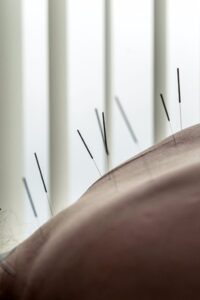
Feeling anxious can be a challenging situation to deal with for many people. When you are in a constant state of anxiety, it can affect your work, your social life, and your overall mental health, which may lead to depression. In recent times, there has been an increasing interest in alternative, holistic treatments to manage anxiety and depression, with acupuncture being one of the most sought-after. Acupuncture, the ancient Chinese practice of inserting needles into specific points of the body, is known for its therapeutic properties and is gaining recognition globally as a safe, efficient, and drug-free treatment for anxiety. Let’s delve into the world of acupuncture and how it can help alleviate anxiety symptoms.
Acupuncture is a drug-free approach that works by stimulating specific parts of the body to balance the flow of energy or “qi.” For anxiety, acupuncture needles are inserted into areas of the body that are thought to affect mood, nerves, and brain chemistry to calm you down and ease your anxiety. Although the effects of acupuncture for anxiety will vary from person to person, some people have reported experiencing relief from anxiety during their first session.
The time it takes for anxiety-related symptoms to improve using acupuncture is dependent on the severity of the anxiety symptoms. Some people may see results after a few sessions, while others may take several sessions. Generally, most acupuncture therapy requires six to eight weekly sessions to significantly reduce anxiety symptoms and 12 sessions for maximum benefit. The duration of each acupuncture session may vary from 30 minutes to an hour, depending on the severity of the anxiety symptoms.
Acupuncture does not suit everybody, but it does have a good track record of helping people with anxiety and depression. It is one of the most popular alternative treatments, with little or no side effects compared to traditional anti-anxiety treatments. Acupuncture does not work quickly as drugs, and it is not an immediate antidote for anxiety. However, it may take some time to see changes – several weeks or months – but your patience and perseverance may stimulate the relaxation responses in your body.
Apart from relieving anxiety and depression, acupuncture treatment also has positive effects on improving sleep quality. Acupuncture’s calming effect on the mind and body relieves pain and anxiety, helping us relax and fall asleep faster. It can enhance the production of melatonin, a sleep hormone responsible for regulating our sleep-wake cycle, and calm the central nervous system. In addition to sleep and anxiety, acupuncture may help regulate mood swings, boost immunity, decrease inflammation, and improve overall body function.
Acupuncture can be an effective treatment for anxiety, depression, and sleep disorders. The length of time, number of treatments, and severity of the condition will influence how long it takes for the benefits of acupuncture to become apparent. Although it does not work overnight, sticking to a consistent schedule with a licensed acupuncturist can have transformative results in the long run. While acupuncture is not a replacement for prescribed medication, it is an appealing alternative for those seeking drug-free relaxation. With acupuncture’s ancient healing practices, you could be on your way to a more relaxed and anxiety-free life.


Follow Us